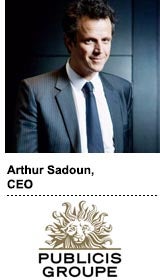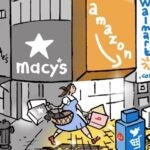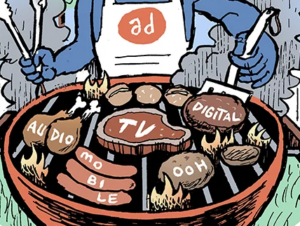Publicis Groupe, after years of struggling in North America, was on its way back to positive performance at the beginning of Q2.
Then COVID-19 hit, and organic growth declined 6.8% for the quarter and 3.3% for the first half of the year.
“We were really off to a good 2020,” CEO Arthur Sadoun said on the earnings call on Thursday. “We have been working extremely hard in the United States.”
Publicis has led in new business wins in the United States for the past two years, thanks in large part to Epsilon, which has helped it stand out against other holding companies in pitches with its focus on first-party data, Sadoun said.
“No doubt it’s thanks to Epsilon we have the new business rate we’ve had,” he said. “It gives us a massive competitive advantage.”
New business momentum continued in Q2, despite the virus, with Publicis winning Sephora’s media account in the United States, Volvo’s media account in China and expanding its global relationship with Reckitt Benckiser into media and analytics. The group also began to benefit from major wins in Q4, including Novartis and Bank of America.
Despite the traction, COVID-19-related lockdowns across the globe took a big hit. Organic growth decreased 13% globally in Q2 and 8% for the first half of the year.
“There is no doubt we will all have to live with the virus and its economic consequences for a while,” Sadoun said.
Given the pandemic, clients are demanding more services around ecommerce, direct-to-consumer and digital transformation as COVID-19 accelerates these trends, Sadoun said. “In the past few months, we have seen an increased client demand for all the capabilities that drove our strategy in the last few years.”
Global view
Publicis’ regional results varied based on the severity of COVID-19 outbreaks, markets and the length of lockdown periods in specific markets.
June was Publicis’ worst month in the United States, as organic growth declined 7.6% thanks to an increase in virus cases and ongoing social unrest. Organic Q2 growth at Epsilon was similar to Publicis’ overall 13% decrease, as Epsilon’s business was hurt by exposure to the auto and non-food retail sectors.
Publicis was hit particularly hard in France, where the complete shutdown of outdoor media dragged organic growth in the country down by almost 23%. In Germany, however, a shorter lockdown period led to muted declines of 3.4%. APAC was down 5.7% thanks to signs of a Q2 recovery in China.
Publicis’ business model, in which it operates under a single P&L by country, helped mitigate some of the market volatility, Sadoun said.
“We were able to respond faster at the local level and increase account activity,” he said. “It was game changing in this period.”
While Publicis hasn’t announced any layoffs or furloughs, it reduced its cost base by 6.4%, roughly $332 million, in the first half of the year by reallocating talent, freezing new hires and business travel and reducing executive salaries as part of a $550 million cost savings plan set out in April.
Costs could increase as some client categories return to spending in the second half of the year, but Publicis declined to provide guidance for Q3 given the uncertainty and volatility of the pandemic.
“When it comes to our revenue, Q2 could be the low point,” Sadoun said. “But in the face of uncertainty, it is premature to say whether H2 revenue will be better or worse than H1. Some sectors and countries will recover faster than others, and clients will react differently.”















